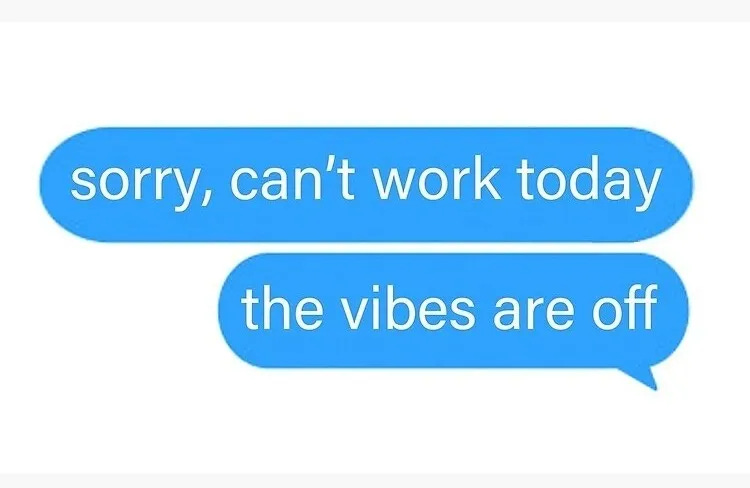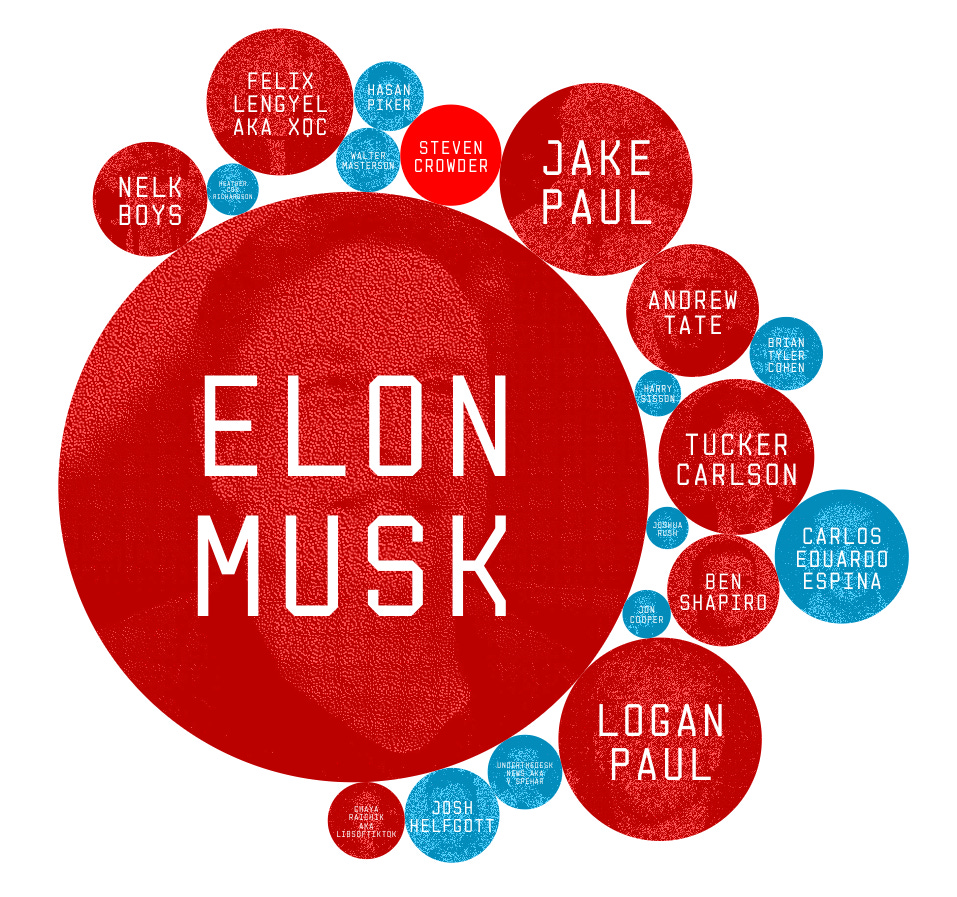The Impenetrable Vibes of Endless Bummers
How social media's cultural impact is formed by the powerful and abstract emotions it emits, not the information it hosts.
Welcome Back
It’s been a couple of weeks since our last newsletter. We wanted to take a beat post-election to evaluate our message here and consider how it connects with what we’re all experiencing.
Plenty of talking heads have been saying it for years, but it’s now undeniable that the center of power has shifted away from legacy media institutions and towards the decentralized content creator jungle where your engagement strategy is no longer about how many, but instead about who. Who you are reaching and who you are reaching them through. The Democratic Party failed to understand this in 2016 and was subsequently and brutally outsmarted by Steve Bannon’s theory of politics. Politics is downstream of culture, and culture is downstream of the internet.
This election proved that his theory isn’t just one way to win an election, it’s now the way to win an election. If you want to succeed–either financially or politically–you need to figure out how to plug into the massive cultural conversation happening online. Those that do will continue to win, and those that don’t will find themselves increasingly irrelevant.
And with that, I feel comfortable moving away from politics as our focus at Noise Level and towards culture as the major lens through which we study the digital noise. So let’s begin.
The Vibes are Off
Does the world feel unrecognizable today? Do other people’s mindsets feel alien to you, and are you perplexed at how even the most basic truths seem up for debate? If you’ve found yourself wondering how so many people believe in such a wildly different set of facts, or how half the country seems to see the world in such a starkly different way than you do, you’re not alone. The whole country feels this way. Half of them just feel that way about you.
So why does reality feel so slippery? Why does it feel impossible to form any consensus about what’s happening and what we should think about it? I don’t have the answers and neither does anyone else, but I suspect I know what’s contributing to it. More and more, we are forming our worldviews and mindsets from a social consensus built online. That social consensus, more than ever before, is no longer produced through objective analysis and logical reasoning but by the emotional “vibes” emitted from the bewildering speed and intensity of online discourse that skew towards the negative, the cynical, and the irreverent.
The Power of Social Consensus
As we gain access to more and more information shoved into delivery mechanisms that are getting faster and faster, our mindsets—the lens through which we see the world—are increasingly shaped by a collective social consensus rather than through our own analysis of that information. As we consume more information at a rate that outpaces our natural and biological ability to digest it, our lenses get blurrier and our reliance on that social consensus increases. We look more to our social networks to see what everyone else thinks and to take cues from the people around us. Today, our social consensus is no longer meaningfully formed by our in-person community or even by people we actually know. It’s now formed by algorithmically fed digital content and discourse from influencers and online personalities, the reactions to that discourse, and the reactions to those reactions.
At some level, humans have always formed their mindsets and developed their conceptions of reality through social consensus. We like to think of ourselves as rational people capable of reading facts, witnessing events, and distilling the “truth” all within the vacuum of our mind and through the irrefutable science of logic. None of us do that, though. We are tribal animals, at the end of the day. We take cues from the people around us who tell us what is cool, interesting, or worth our time. When we don’t know what to think about something we tend to, at some level, copy the opinions of those around us. Even the most ardent contrarians do this even if they won’t admit it.
Unfortunately, the social consensus we take cues from now isn’t a coherent signal. It’s not generated through carefully worded essays or from the calming voice of an evening news anchor. It’s not shaped by logic or facts or explained to us in explicit terms. It instead manifests as vibes. Abstract, amorphous emotional undertones that are formed by both the speed and intensity of online content. The intensity–conflict-driven, heated opinion spewing that happens online–generates the emotion, and the speed it comes to us distorts the coherency of the message. What you are left with is a feeling and maybe, at best, a couple of out-of-context facts you picked up along the way that may or may not be true.
The pace of online content is so relentless that there’s no time to process it meaningfully. What sticks isn’t a signal, but a feeling. A set of abstract emotions. And those feelings—those vibes—are shaping our culture in profound ways. Both by the natural properties of this digital ecosystem and by people who have figured out how to manufacture them.
Impenetrable Vibes
To center this all on “vibes” seems reductive and inadequate. I get that. But the frustration and confusion we all feel when we think about this media environment suggests the answer isn’t scientific and objective. The digital ecosystem is abstract and intangible and so are vibes. Some online discourse might be coherent and healthy debates, but when you aggregate that discourse and feed it to people at lightspeed, the coherency breaks down. That is the “noise” we reference here so often, and the end product of that noise is a vibe that the consumer leaves with. Those vibes, I argue, have become the building blocks of our mass cultural production.
This is where things get tricky. Online spaces are where our cultural conversations happen now. They’re the incubators for pre-political culture. These are the ideas, memes, and narratives that take root in culture and create permission structures for political appeals. They are something for political strategists to exploit, not create.
But therein lies the problem: these vibes are both abstract and incredibly powerful. Everyone wants to influence them, but they are difficult to even define, let alone change. There’s a feeling online that shifts our cultural mindsets and political opinions and they are, as we have all seen, fairly immune to logical reasoning. Not just in the most radical spaces, but everywhere. On the left and the right. Facts, evidence, or even well-constructed arguments rarely break through. And when you think about social media as a high-strung emotional state rather than a marketplace of information, it begins to make sense. The more emotional someone gets, the less appetite they have for the soothing properties of fact-based appeals. When emotions get intense enough, they become impenetrable. They transform from a byproduct of reality into reality itself. These vibes are impenetrable.
Endless Bummers
One of the most troubling parts of this new reality is the negativity that comes with it. In our current online culture, nothing is sacred. Nothing is worthy of inherent respect. Irreverence isn’t just common, it’s currency. The more cynical, mocking, or dismissive you can be, the better your content performs.
This irreverence fuels a relentless sense of despair. Everything feels worse than it is. Even moments of genuine progress or good news are drowned out by the cacophony of skepticism and bad takes that prove overwhelming to our social consensus. The internet has become a machine that churns out endless bummers, and we’re all stuck on the assembly line.
So, where does that leave us? Like I said earlier, I don’t have all the answers. No one does. But here’s what I do know: this isn’t a phase. It’s not some awkward adjustment period while we get used to the internet. This is the new media reality, and it’s here to stay.
What Do We Do About This?
If you want to influence this world, you can’t keep clinging to the old playbook. You can’t just preach from a pedestal, believing naively that truth will always prevail because it’s right. We misinterpret the truth all the time for a myriad of reasons, one of which is because of our emotional state. And we are all pretty emotional these days, no matter who you vote for or how many Ivy League degrees you have.
We need to meet people where they are. That means engaging in the media ecosystem as it exists today, not as we wish it would be. Fifty years ago, if you wanted to influence the public discourse, you started a newspaper or a magazine. Those platforms held the levers of power. Today, those levers are podcasts, YouTube channels, and TikTok accounts. If you want to shape culture, you have to be part of the cultural conversation. You have to change the vibes of the digital ecosystem by adding your own noise—culturally resonant noise. That means creating content that doesn’t just inform, but also entertains and connects. It means using the tools of this new media landscape to reach people and build the public appetite for the world you want to live in.
And let me be clear, this isn’t about dumbing down complex ideas or pandering to the lowest common denominator. It’s about understanding the cultural moment and finding ways to inject meaningful perspectives into it. It’s about meeting the vibes head-on and reshaping them from the inside out.
It’s a daunting task. It requires creativity, persistence, and a willingness to adapt. But if we don’t engage, we’re ceding the cultural conversation to the loudest, most divisive voices in the room on both sides of the political spectrum and from every pre-political social faction. And let me tell you, they know how to make engaging content.
If you want to change the course of our world, you can’t afford to sit on the digital sidelines. The internet is where culture happens now. That means having an appetite for failure, and a willingness to sometimes abandon a well-researched and over-measured approach in favor of speed and responsiveness. These media cycles are comically short and so are our attention spans. Embrace that. It means sometimes embracing the weird, the irreverent, and the viral—not as an end, but as a means to something greater.






